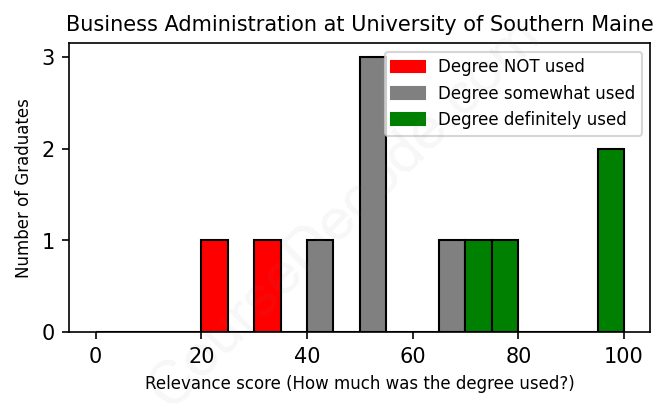
First, some facts. Of the Business Administration graduates from University of Southern Maine we've analyzed , here's how many have used (or NOT used) their degree in their career:

These are estimates based on AI analysis of 11 LinkedIn profiles (see below).
The verdict? Below average. Overall, with an average relevance score of 59%, Business Administration graduates from University of Southern Maine have a lower likelihood (-8%) of finding work in this field compared to the average graduate across all fields:
And for comparison, here's the chart for all profiles we've looked at across all degrees.
Also, after graduating, only 9% of these graduates have pursued further education other than another Bachelor's degree (such as a Masters degree or other), compared to the average across all profiles of 35%. This suggests a Bachelors degree is enough for most Business Administration graduates, and it's normal to look for work straight after graduation.
See the details:
|
Relevance score: 50% We think this person has gone into a career only somewhat relevant to their degree. We think this person has gone into a career only somewhat relevant to their degree.
DEGREE INFOGraduated in 2018 from University of Southern Maine with a Bachelors of Business Administration in Business Administration. No other secondary education since. JOB HISTORY SINCE GRADUATIONRegistered Sr Administrative Assistant Pension Professionals Mar 2024 - Present ABOUTLooking to bring my passion of helping people and being a part of a strong team to the next level. Motivated and energetic team member and leader. |
The top 10 most common jobs done by the graduates we've analyzed (ranked most common to least) are:
Based on the job profiles of individuals who graduated with a Business Administration degree from the University of Southern Maine, it seems that many have ventured into roles like sales associates, administrative positions, and project coordinators. A lot of these roles focus more on customer interaction and support rather than the deeper business management concepts you learn in school. For instance, several grads have worked as sales associates in jewelry stores or as associates in banks, which, while they might benefit from some soft skills or basic organizational skills learned in their studies, don't really tap into the core business principles of planning, strategy, or financial management that you'd expect from a Business Administration degree.
However, there are a few standout positions that really make use of that business education. For example, roles like Assistant Product Manager and Business Analyst display a solid connection to the skills and knowledge acquired during their studies. These positions involve project management, strategic analysis, and product development, which are much more aligned with what you'd expect from a Business Administration background. Still, the general trend shows that a significant number of these graduates end up in jobs that don’t fully utilize their degree, leaning more towards customer service or administrative tasks rather than making big decisions or managing teams. It just goes to show that while a degree in Business Administration opens up many doors, the path people take can vary quite a bit!
Here is a visual representation of the most common words in job titles for Business Administration graduates (this is across all Business Administration graduates we've analyzed, not just those who went to University of Southern Maine):

When we look at the career trajectories of graduates from the University of Southern Maine with degrees in Business Administration, it seems like there are a mix of paths taken. For many, the first jobs after graduation tend to be in sales, administrative roles, or entry-level positions related to finance and project management. For example, a lot of recent graduates started out as sales associates or in customer service, which makes sense since these roles help develop crucial communication and problem-solving skills that are highly valued in business environments. As they gain experience, they seem to transition towards more specialized positions, like financial analysts or project specialists, which often involve more responsibility and industry-specific knowledge.
Looking a bit further out, say five to ten years after graduation, many graduates seem to stabilize in their careers and take on more significant roles. Some have landed managerial positions, like Town Manager or Officer roles in commercial lines, which show that they’ve developed their skills and moved up the ladder. Others have found their niche in fields like finance or human resources, which suggest that a good number of these graduates are finding meaningful careers that align with their degree. Overall, it appears that while some have faced challenges and have had their share of less relevant roles initially, many are able to carve out solid career paths in business-related fields within a few years of graduating. So, it looks like a degree in Business Administration can indeed lead to some good and relevant career opportunities over time!
Honestly, a Bachelor degree in Business Administration tends to be on the more manageable side compared to some other fields, but it definitely has its challenges. At the University of Southern Maine, you can expect a mix of core classes, like finance and marketing, along with some group projects and case studies that can be a bit of a time sink. If you stay organized and keep up with your assignments, you’ll likely find it more accessible than, say, a degree in engineering or the sciences. But like any program, it requires dedication, especially if you're really aiming to understand the material and make the most of your experiences. Just remember, every student has their own strengths and weaknesses, so it's really about finding your groove!
Most commonly, in the LinkedIn profiles we've looked at, it takes people 4 years to finish a Bachelor degree in Business Administration.
Alright, so looking at these University of Southern Maine grads, it seems like they've had a pretty mixed bag when it comes to money. The earlier graduates, especially those sticking to sales roles in jewelry and insurance, likely didn't rake in the big bucks initially – sales associate positions typically don’t pay that well, especially in retail. The ones who went into more specialized roles, like financial analysts or project specialists, probably saw a decent increase in their earnings over time as they progressed into higher positions. The younger grads, like the one who just became a business owner, could have a lot of potential to make money if their venture takes off. Overall, it looks like some have found paths to decent salaries, but others may still be working their way up the ladder. It really depends on the specific career trajectory and industry!
Here is a visual representation of the most common words seen in the "about" section of LinkedIn profiles who have a Bachelor degree in Business Administration (this is across all Business Administration graduates we've analyzed, not just those who went to University of Southern Maine). This may or may not be useful:

Here are all colleges offering a Bachelor degree in Business Administration (ordered by the average relevance score of their Business Administration graduates, best to worst) where we have analyzed at least 10 of their graduates: